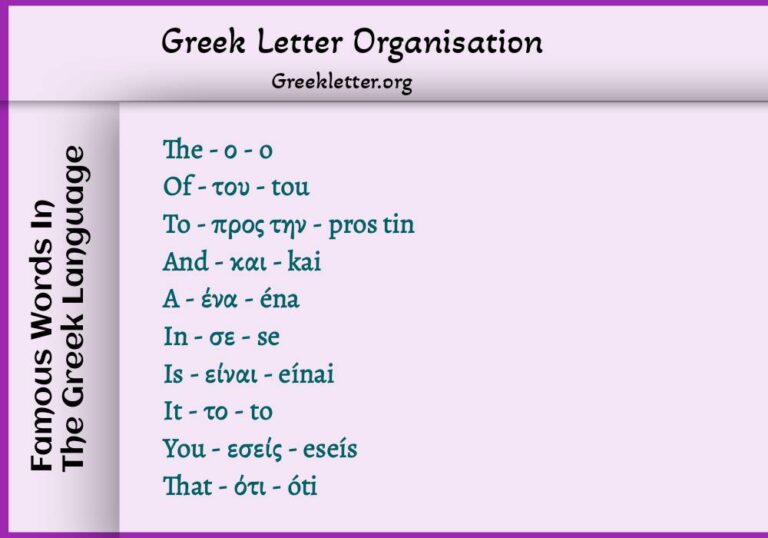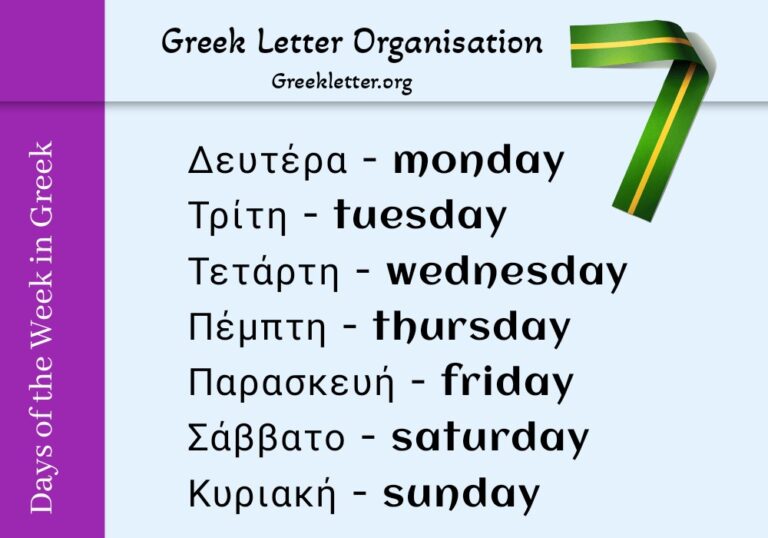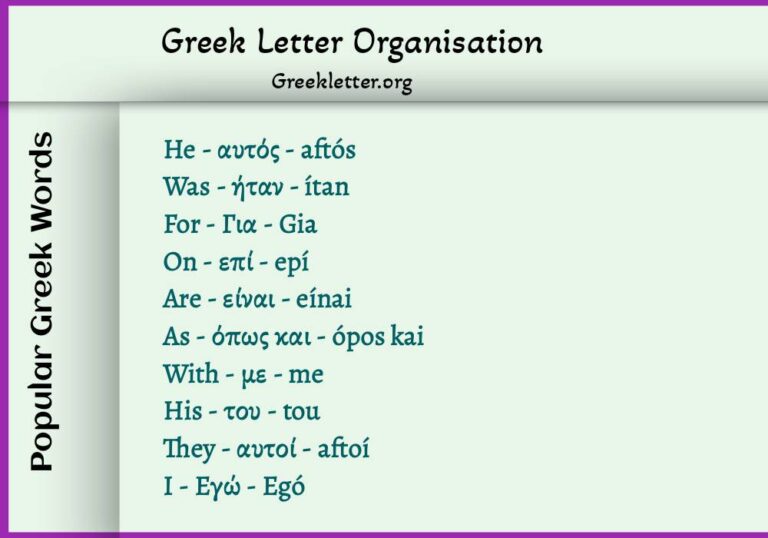How Do You Say Please And Thank You In Greek
Have you ever found yourself in a foreign country, desperately trying to navigate the nuances of polite conversation? Well, fear not! This article will explore the beautiful Greek language and discover how to express two essential words: please and thank you.
Whether planning a trip to Greece or simply wanting to impress your Greek friends, mastering these phrases will go a long way in showing your appreciation and respect.
So, grab your notebook and get ready to expand your linguistic horizons as we delve into saying please and thank you in Greek. And don’t worry – with our helpful audio guide, pronunciation won’t be an issue!
How Do You Say Please And Thank You In Greek
In Greek, expressing politeness through “please” and conveying gratitude with “thank you” is essential in social interactions. Here’s how to say “please” and “thank you” in Greek:
Please – Παρακαλώ (Parakaló):
- Pronunciation: pah-rah-KAH-loh
- Meaning: “Παρακαλώ” (Parakaló) is the Greek equivalent of “please” in English. It is used to make requests politely and show courtesy.
- Usage: You can use “Παρακαλώ” before making a request or asking for something. For example, “Μια κούπα καφέ, παρακαλώ” (One cup of coffee, please).
Thank You – Ευχαριστώ (Efcharistó):
- Pronunciation: ef-khah-ree-STOH
- Meaning: “Ευχαριστώ” (Efcharistó) translates to “thank you” in English. It is used to express gratitude and appreciation.
- Usage: “Ευχαριστώ” is used to convey thanks for a kind gesture, help, or service. It’s an important phrase to express appreciation in various situations.
Using “Παρακαλώ” and “Ευχαριστώ” appropriately shows respect and politeness in Greek culture, enhancing your interactions and demonstrating your appreciation for the people you are communicating with.
How To Say Please And Thank You In Greek
Politeness is highly valued in Greek culture, and “please” and “thank you” appropriately signify respect and courtesy. Here’s how to say “please” and “thank you” in Greek:
Please – Παρακαλώ (Parakaló):
- Pronunciation: pah-rah-KAH-loh
- Meaning: “Παρακαλώ” (Parakaló) is the Greek equivalent of “please” in English. It serves as a polite request when you want to ask for something or make a favor more courteous.
- Usage: You can use “Παρακαλώ” before stating your request. For example, when ordering at a restaurant, you can say “Έναν καφέ, παρακαλώ” (One coffee, please). It adds politeness to your interactions.
Thank You – Ευχαριστώ (Efcharistó):
- Pronunciation: ef-khah-ree-STOH
- Meaning: “Ευχαριστώ” (Efcharistó) means “thank you” in Greek. It is used to express gratitude and appreciation.
- Usage: Whenever someone helps you, offers something, or does a kind gesture, saying “Ευχαριστώ” is a polite way to convey your thanks. For example, if someone holds the door for you, you can say “Ευχαριστώ” to express your gratitude.
Using “Παρακαλώ” and “Ευχαριστώ” in your conversations with Greek speakers is a simple yet significant way to show respect and appreciation. It enhances the quality of your interactions and reflects your understanding of Greek social norms and etiquette.
How Do You Say Please And Thank In Greek Audio
In Greek, expressing politeness and gratitude is an essential part of everyday communication. Whether you are planning to visit Greece or simply interested in learning the basics of the language, knowing how to say please and thank you is a great place to start.
Παρακαλώ Audio
Please, in Greek, is pronounced parakalo. This word carries a sense of politeness and can be used in various contexts. For example, when ordering food at a restaurant, you can say Ena galaktoboureko, parakalo, meaning One Galaktoboureko, please. The audio below lets you hear how this polite gesture sounds in Greek.
Ευχαριστώ Audio
On the other hand, saying thank you in Greek involves different expressions depending on the situation. The most common way to express gratitude is by saying efharisto. You can use it in daily interactions, such as thanking someone for their help or expressing appreciation for a gift. Give it a try: Click on the audio below and repeat after hearing how native Greeks pronounce this warm expression of gratitude.
Navigating Greek greetings confidently involves understanding when and how to use them appropriately. Here’s the full list of Greek greetings to help you engage with confidence:
- Γειά σας (Yiá sas) – Hello (formal).
- Χαίρετε (Cheírete) – Hello (formal).
- Γειά σου (Yiá sou) – Hello (informal).
- Γεια σας (Yia sas) – Hi (formal).
- Γειά σου (Yia sou) – Hi (informal).
- Καλημέρα (Kaliméra) – Good morning.
- Καλησπέρα (Kalispéra) – Good evening.
- Καληνύχτα (Kaliníkhta) – Good night.
- Γεια (Yia) – Hi/Hello.
- Χαίρω πολύ (Cheíro polý) – Nice to meet you.
- Τι κάνετε; (Ti kánate?) – How are you? (formal).
- Τι κάνεις; (Ti kánis?) – How are you? (informal).
- Καλώς ήρθατε (Kalós írthate) – Welcome (formal).
- Καλώς ήρθες (Kalós írthes) – Welcome (informal).
- Καλή ημέρα (Kalí iméra) – Good day.
- Καλή εβδομάδα (Kalí evdomáda) – Have a good week.
- Καλό Σαββατοκύριακο (Kaló Savvatokýriako) – Have a good weekend.
- Καλή διακοπές (Kalí diakopés) – Have a good vacation.
- Καλό ταξίδι (Kaló taxídi) – Have a good trip.
- Καλή τύχη (Kalí týchī) – Good luck.
With this comprehensive list, you can confidently navigate various social situations in Greece, whether engaging in formal or informal conversations, offering greetings, expressing goodwill, or showing appreciation. Understanding the cultural context of these greetings will help you connect with Greek speakers on a deeper level.
Conclusion Points
In conclusion, learning to say please and thank you in Greek is a simple yet powerful way to show respect and gratitude in this beautiful language. By using the phrases παρακαλώ (parakaló) for please and ευχαριστώ (efcharistó) for thank you, you can easily navigate polite interactions with locals or impress your Greek-speaking friends.
Remember to practice these expressions regularly to master their pronunciation and usage. So why wait? Start incorporating these phrases into your everyday conversations and experience the warm reception and appreciation from Greek speakers that comes with it.
FAQs
1. How do you say please in Greek?
– The word for please in Greek is παρακαλώ (parakaló).
2. What is the Greek term for thank you?
– The Greek term for thank you is ευχαριστώ (efcharistó).
3. Can you provide a pronunciation guide for saying please and thank you in Greek?
– Sure! The pronunciation of please is pah-rah-kah-LOH, and for thank you, it’s ef-hah-rees-TOH.
4. How would I use the phrase please in a sentence?
– Please use it by placing it at the beginning or end of a sentence. For example, Please give me a glass of water would be Παρακαλώ δώστε μου ένα ποτήρι νερό (Parakaló dóste mou éna potíri neró) in Greek.
5. When should I say thank you in Greek?
– It’s customary to say thank you after receiving help, gifts, or any act of kindness. Use ευχαριστώ (efcharistó) to express your gratitude.
6. Is an audio guide available for learning to say please and thank you in Greek?
– Yes, our website has an audio guide that properly pronounces both phrases.
7. Are there any alternative ways to express politeness and gratitude in Greek?
– In addition to saying please and thank you, Greeks often use other polite expressions such as συγνώμη (si-GNÓ-mi) meaning sorry/excuse me and παρακαλώ πολύ (parakaló pólü) meaning please very much.
8. Can you recommend any other Greek phrases that would be helpful for polite interactions?
– Certainly! Learning simple phrases like hello (Γεια σου – ya SOU) and goodbye (Αντίο – an-DEE-o) can go a long way in showing politeness during conversations.






